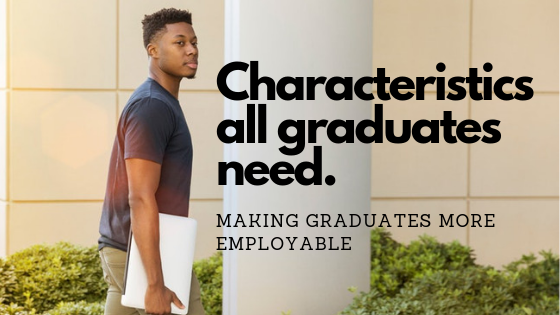This blog post is in collaboration with StudentJob, make sure you check out Occumi’s post on StudentJob’s blog here!
Exam season is underway, but soon graduates will be waving their mortarboards in the air and starting the next chapter of their lives. But, how will they stand out? This article looks into how harnessing key characteristics will make graduates more employable.

Transferable skills and personal characteristics
Transferable skills are attributes that do not belong to a particular industry, niche or talent. Instead, they are generalised skills, which can be demonstrated in almost every setting imaginable.
Communication, teamwork and adaptability are just a number of transferable skills which can be used effectively to achieve results, solve issues and to maintain a positive dynamic within a work or educational environment.
However, in addition to transferable skills, there are several personal characteristics that can help a graduate stand out from the rest.
Personal characteristics are the qualities that an individual has in addition to their skills. Personal characteristics are often less tangible than transferable skills and include traits such as trustworthiness.
What are the employer demands for graduates?
It is every student’s desire to graduate with a 1st classification. Nonetheless, graduates can acquire all knowledge of discipline but will become stuck if unable to utilise it in a working environment.
Mcmurrary et al. (2016) suggested that employers recruiting graduates focus on the following factors: social characteristics and employability skills, relevant work experience and degree results.
Ranked in importance, it goes to show that having desired personal characteristics can be the deciding factor whether a graduate is hired or not.
Although skills play a hugely significant role in the graduate recruitment process, it is important that graduates are aware of the importance of their personal characteristics in the recruitment process.
Many graduates may believe that technical skills (such as programming) hold the utmost importance in the recruitment process.
However, Mcmurray et al (2016) contradicted this point and said employers favoured social characteristics such as: trustworthiness, reliability, motivation, and a willingness to learn.
It may seem easy enough to uphold these characteristics, however, if that was the case the supply of high quality graduates would be sky-high.
Why are these characteristics valued?
Trustworthiness
Trustworthiness in a social setting can mean keeping a well-guarded secret or promising to pay back that 10 pounds owed from a night out.
For employers, however, trustworthiness is a little different.
Trustworthiness and conscientiousness encourage employees to act with integrity and to keep in line with their values.
Employers will value a graduate far greater if they are dedicated to the role, give no mistrust and take responsibility for their own actions.
Reliability
Being a reliable co-worker is formed with many layers and focuses heavily on personal skills.
Employers will seek graduates who act independently whilst maintaining high levels of time management. Additionally, being a team player demonstrates this personal attribute. Working in a fast-paced environment typically involves ever-changing projects. If a graduate can provide their resilience to help others, employers will appreciate this.
Motivation
Keeping a healthy work dynamic is a concern of every well-managed team. Therefore, having evident motivation skills is crucial.
There is no denying it, days at work can be tough; receiving tough criticisms, conflict and person issues can all play a part.
Staying motivated is key to productivity and proactiveness. And if graduates are able to demonstrate this through their extracurricular activities and achievements, then employers will consider this as a factor.
Willingness to learn
If an employer is willing to invest time, money and plentiful training opportunities, then they expect the same in return.
Willingness is a two-way street.
Graduates should have the desire to continuously improve themselves whether it is in a work or educational environment.
How is a graduate expected to harness these characteristics?
A graduate can develop these characteristics in a number of ways:
- Work experience
- Extra-curricular activities
- Participating in employability workshops
- Undergoing group projects
- Graduate mentor
Sources:
Stephen McMurray, Matthew Dutton, Ronald McQuaid, Alec Richard, (2016) “Employer demands from business graduates”, Education + Training, Vol. 58 Issue: 1,pp.112-132, https://doi.org/10.1108/ET-02-2014-0017
About the author…
This article was written by Megan Bryant, an Online Marketer for StudentJob UK. If you are a graduate seeking application advice, check out our free guides with a nice cup of tea.

